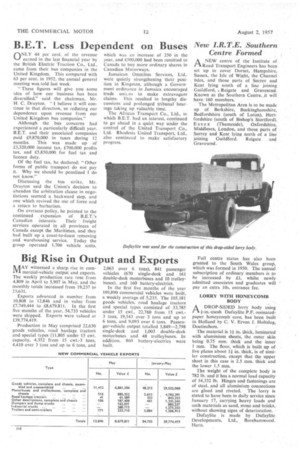B.E.T. Less Dependent on Buses
Page 44

If you've noticed an error in this article please click here to report it so we can fix it.
QNLY 44 per cent. of the revenue earned in the last financial year by the British Electric Traction Co., Ltd.. came from their bus companies in the United Kingdom. This compared with 63 per cent, in 1952, the annual general meeting was, told last week.
"These figures will give you some idea of how our business has been diversified," said the chairman, Mr. H. C. Drayton. "I believe it will continue in that direction, so reducing our dependence upon revenue from our United Kingdom bus companies."
Although the bus concerns had experienced a particularly difficult year. B.E.T. and their associated companies paid £9,870,000 in taxes during 12 months. This was made up of £3,320,000 income tax, £700,000 profits tax, and £5,850,000. for fuel tax and licence duty.
Of the fuel tax, he declared: " Other forms of public transport do not pay it. Why we should be penalized I do not know."
Discussing the bus strike, Mr. Drayton said the Union's decision to abandon the arbitration clause in negotiations seemed a backward step, and one which revived the use of force and a return to barbarism.
On overseas policy, he pointed to the continued expansion of B.E.T.'s Canadian interests: Their freight services operated in all provinces of Canada except the Maritimcs, and they had built up a coast-to-toast removing and warehousing service. Today the group operated 1,700 vehicle units. which was an increase of 250 in the year, and £500,000 had been remitted to Canada to buy more ordinary shares in Canadian Motorways.
Jamaican Omnibus Services, Ltd.. were quietly strengthening their position in Kingston, although a Government ordinance in Jamaica encouraged trade uniGns to make extravagant claims. This resulted in lengthy discussions and prolonged tribunal hearings taking up valuable time.
The African Transport Co., Ltd., in which B.E.T. had an interest, continued to go ahead in a quiet way under the control of the United Transport Co., Ltd. Rhodesia United Transport, Ltd.. also continmd to make satisfactory progress.








































































































